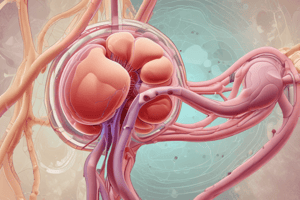Podcast
Questions and Answers
Which hormone stimulates calcium reabsorption in the Early Distal Convoluted Tubule?
Which hormone stimulates calcium reabsorption in the Early Distal Convoluted Tubule?
- Aldosterone
- Parathyroid Hormone (correct)
- Natriuretic Peptide
- Antidiuretic Hormone
What is the primary site of sodium reabsorption in the renal tubule?
What is the primary site of sodium reabsorption in the renal tubule?
- Proximal Convoluted Tubule (correct)
- Collecting Tubules
- Early Distal Convoluted Tubule
- Loop of Henle
What characterizes the Thin Ascending Limb of the Loop of Henle?
What characterizes the Thin Ascending Limb of the Loop of Henle?
- Impermeable to water (correct)
- Primary site for potassium absorption
- Active reabsorption of sodium
- Permeable to water and urea
In the context of tubuloglomerular feedback, what does the macula densa primarily detect?
In the context of tubuloglomerular feedback, what does the macula densa primarily detect?
What is the main function of intercalated cells in the Late DCT?
What is the main function of intercalated cells in the Late DCT?
Which of the following statements about the Loop of Henle is true?
Which of the following statements about the Loop of Henle is true?
What does the term 'secretion' refer to in renal function?
What does the term 'secretion' refer to in renal function?
How does antidiuretic hormone (ADH) affect the principal cells in the Late DCT?
How does antidiuretic hormone (ADH) affect the principal cells in the Late DCT?
What is the primary function of Angiotensin II in the renal system?
What is the primary function of Angiotensin II in the renal system?
Which component is primarily responsible for detecting low blood pressure in the renal system?
Which component is primarily responsible for detecting low blood pressure in the renal system?
How does aldosterone primarily affect the renal tubule?
How does aldosterone primarily affect the renal tubule?
Which hormone, secreted by the posterior pituitary gland, plays a role in water reabsorption?
Which hormone, secreted by the posterior pituitary gland, plays a role in water reabsorption?
What role does arginine vasopressin (AVP) play in the renal system?
What role does arginine vasopressin (AVP) play in the renal system?
Flashcards are hidden until you start studying
Study Notes
Tubuloglomerular Feedback
- Increases in NaCl concentration are detected by the macula densa.
- The macula densa releases adenosine in response to elevated NaCl.
- Adenosine causes afferent arterioles (AA) to constrict, while nitric oxide induces dilation.
Reabsorption
- Reabsorption is the process of removing substances or water from the luminal fluid back into the body.
Proximal Convoluted Tubule (PCT)
- Responsible for the majority of reabsorption in the renal system.
- Reabsorbs significant amounts of water and sodium (approximately 40%).
- Also absorbs amino acids, glucose, and electrolytes such as magnesium, calcium, and potassium.
- Sodium reabsorption is facilitated by the Na-K ATPase pump.
Loop of Henle
-
Thin Descending Limb
- Highly permeable to water due to aquaporin-1 channels.
- Produces the most concentrated luminal fluid.
-
Thin Ascending Limb
- Impermeable to water.
-
Thick Ascending Limb
- Responsible for sodium reabsorption, with significant transport of magnesium, calcium, and potassium.
- Water is not permeable.
Early Distal Convoluted Tubule (DCT)
- The segment does not permit water permeability.
- Sodium is reabsorbed via the Na–Cl cotransporter (Ncc).
- Parathyroid hormone (PTH) enhances calcium reabsorption in this segment.
Late DCT & Collecting Tubules
- Principal cells are involved in sodium reabsorption and allow for ADH-induced water reabsorption.
- Intercalated cells perform reabsorption:
- Type A cells reabsorb bicarbonate and potassium.
- Type B cells reabsorb chloride and hydrogen ions.
Secretion
- Secretion involves the transfer of substances, particularly wastes, from tubular cells into the luminal fluid.
- Plays a crucial role in regulating urine output and excreting metabolic waste.
Renal System Components
- Proximal Convoluted Tubule (PCT) absorbs creatinine, hydrogen, urea, ammonium (NH4_44), and drugs.
- Loop of Henle primarily processes urea.
- Distal Convoluted Tubule (DCT) manages hydrogen, potassium (K), NH4_44, and various drugs.
- Collecting Duct also regulates hydrogen, potassium, NH4_44, and drugs.
Renin-Angiotensin-Aldosterone System (RAAS)
- Triggered by Low Blood Pressure (LBP) to help regulate Blood Pressure (BP).
- Primary outcome is the production of Angiotensin II, a potent vasoconstrictor that increases blood volume.
RAAS Mechanism
- The Sympathetic Nervous System (SNS) detects LBP, activating Juxta Glomerular Cells to release Renin.
- Renin converts Angiotensinogen (produced in the liver) to Angiotensin I.
- Angiotensin I is converted to Angiotensin II by the Angiotensin-Converting Enzyme (ACE) located in the lungs and kidneys.
- Angiotensin II induces systemic arterial vasoconstriction and stimulates the adrenal cortex to release aldosterone.
- Aldosterone enhances sodium reabsorption and facilitates potassium excretion, resulting in increased blood volume.
Other Factors Affecting Blood Pressure
- Hypothalamus regulates water intake and the release of vasopressin to aid water reabsorption.
- Posterior Pituitary Gland secretes Antidiuretic Hormone (ADH, or Vasopressin), promoting water reabsorption in the kidneys.
- Arginine Vasopressin (AVP) functions as a vasoconstrictor, contributing to blood pressure regulation.
Studying That Suits You
Use AI to generate personalized quizzes and flashcards to suit your learning preferences.




